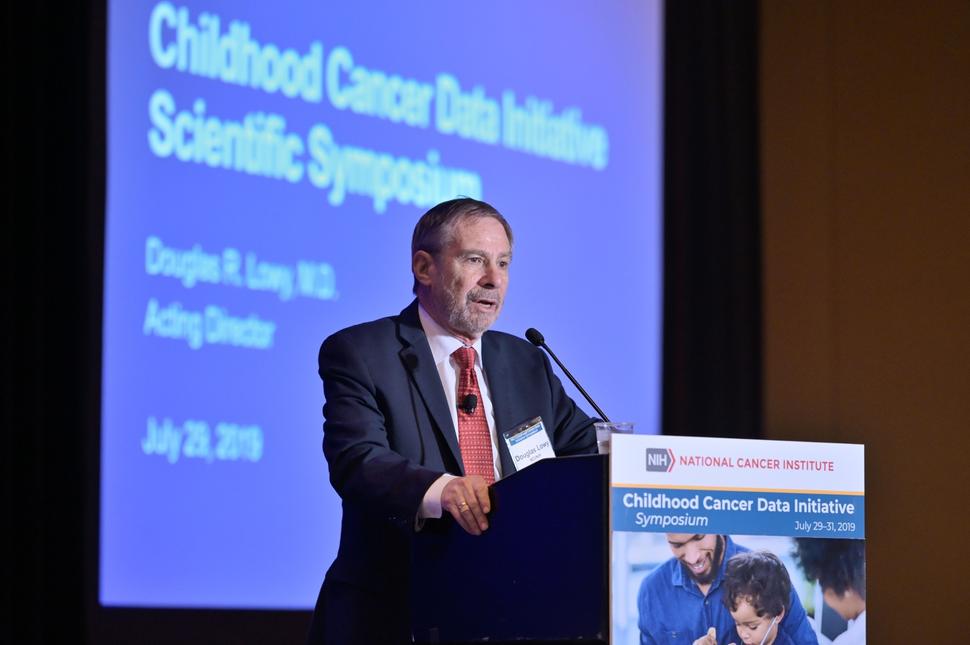2021 Childhood Cancer Data Initiative Symposium
The Childhood Cancer Data Initiative (CCDI) Symposium brings together people from across the childhood cancer community to discuss CCDI progress and community priorities.
Revisit previous symposium recordings and summaries. Please contact CCDIevents@mail.nih.gov if you have difficulty downloading or viewing symposium slides.
NCI hosted the CCDI Symposium on November 9, 2021. Thirty-one expert speakers representing the childhood cancer research, care, and advocacy communities shared CCDI’s recent progress, identified next steps and priorities for the initiative, and listened to patients and advocates describe their needs and issues.
Symposium Welcome
Then NCI Director Dr. Norman Sharpless opened the symposium with optimistic yet grounded remarks on the current state of childhood, adolescent, and young adult cancers, expressing hope that CCDI will contribute to progress in research and treatment. He shared his view that we are in a golden age in cancer research fueled by large amounts of data generated in the clinic and the lab. Challenges and barriers remain in collecting these data from every child diagnosed with cancer. CCDI aims to address some of these challenges to lead to new discoveries and decrease the burden of cancer for individuals, their families, and communities.
Naomi Bartley, an advocate, informaticist, and childhood cancer survivor, provided the keynote talk and graciously shared her story. She discussed her treatment, its ramifications, the impact cancer had on her life as well as her daughter’s, and the importance of the work being done under CCDI. Her perspective provided an important reminder of the long-lasting effects childhood cancer can have on families.
CCDI Progress
Speakers gave an overview of CCDI’s goals and successes to date.
A key objective for CCDI is the development of a federated infrastructure to help manage and share data, including a searchable catalog of childhood cancer data, tools, and resources. Progress was evident as researchers presented their efforts in improving data sharing, collection, and analysis.
Key Focus Areas
The symposium focused on three areas crucial to the success of CCDI and how we can learn from every child, adolescent, and young adult (AYA) with cancer.
Learn from Every Child and AYA: Molecular Characterization for Every Child Diagnosed with Cancer
Understanding the molecular characteristics of childhood cancers is vital for advancing precision care. Sequencing the genomics of every child’s cancer will enhance the current knowledge base on existing variants.
- To learn from every child with cancer, NCI established the Molecular Characterization Initiative, built on the Children’s Oncology Group’s Project:EveryChild, to perform molecular characterization on children and AYAs at diagnosis and provide information back to the child’s family and clinicians to help with treatment decisions.
- OncoKB, the first FDA-recognized database of cancer variants was created.
- Texas KidsCanSeq and Pediatric MATCH offered lessons learned from genetic testing, including the importance of having a genetic counselor on hand to deliver and discuss results or to address follow-up questions, whether those results are given in person or by telemedicine.
CCDI speakers also gave insight into which types of genetic testing are proving most useful and how they are managed and conducted at different institutions.
Extract Data from Electronic Health Records (EHRs) in Real Time
EHRs offer rich data that document someone’s full medical journey and long-term outcomes. By extracting data from EHRs, researchers can look at larger populations. This also helps engage every child and better represent underserved groups.
Engage with People with Childhood Cancer and Their Families
The symposium’s closing panel took a special focus on who this initiative will affect most directly: patients and their families. Themes included:
- the importance of making molecularly informed medicine available to all patients, no matter their insurance status, location, or treatment facility
- the need for tumor typing to be offered early, with the data available to help other families
- the opportunity to handle some clinical care and trials remotely, especially for those in underserved communities
- the importance of greater data accessibility and availability, not only to break down existing silos for future research, but so that the data can inform current treatment decisions and potentially improve outcomes
At the heart of CCDI is the desire to learn from and treat every child and AYA with childhood cancer. This includes underrepresented minority and underserved populations. Not all children and AYAs have equal access to care. The Children’s Oncology Group, an NCI-supported clinical trials group, operates state-of-the-art centers, but their facilities are not available in all parts of the country or to all patients with cancer. Intentional outreach activities need to be fully inclusive (racially, ethically, and culturally).
The CCDI Engagement Committee is an important part of CCDI to help build relationships with patients, families, and communities, especially those who are underrepresented in childhood cancer research.
Symposium Conclusion
CCDI has made significant progress over the past two years in developing a community of pediatric caregivers, data scientists, researchers, advocates, and patients and their families, all working toward a shared vision. The CCDI community has the potential to transform childhood cancer treatments and outcomes, and to act as a model for data sharing and research in adult cancers. In the coming years, CCDI aims to strengthen and grow its community while working towards its goals.
